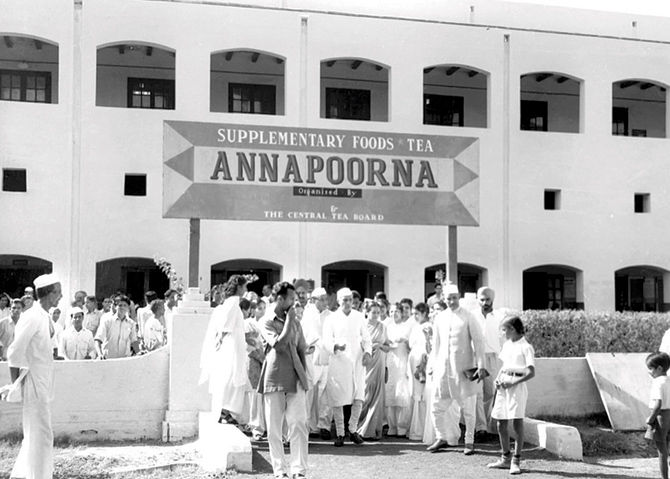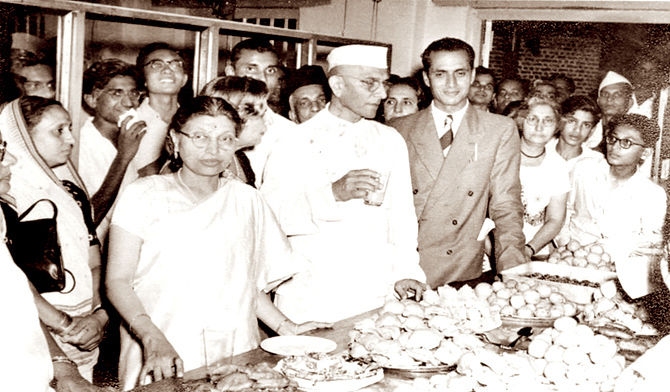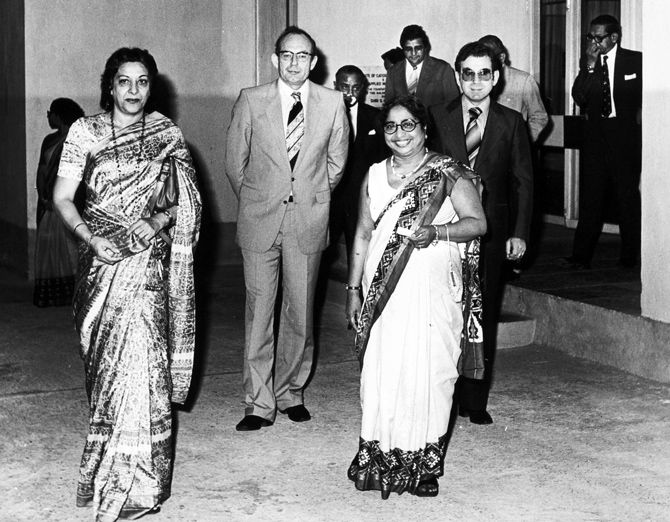
Our Institute, the first of its kind in Asia was founded on June 27, 1954 by the All India Women’s Central Food Council under the leadership of Smt. Lilavati Munshi who was the wife of the then food minister, Mr. KM Munshi.
"Necessity is the mother of All Invention"
It has its humble beginnings in an old army barrack of Bhavans college campus, Versova. Its main aim back then was to provide nutritious food to the common people at economical rates due to a drought the country was facing. To serve this purpose, a chain of Annapoornas (restaurants) was setup throughout the country, primarily in the metropolitan cities by Smt. Lilavati Munshi, with a group of like minded women which included Smt. Homi J H Taleyarkhan and Smt. Leela N Jog. This led to the formation of the All India Women’s Central Food Council
The critical factor however was to find trained personnel who could cater to nutrition as well as run these Annapoornas on a self-financing basis. Hence the necessity of having a training institute emerged.
Hotel management & catering technology was still a young discipline in those days even in the West, in fact, the school of Hotel Administration of Cornell University bifurcated from the Department of Home Economics as a separate faculty only in 1954. There was no technical knowhow in our country too, regarding this field. The ministry of Food & Agriculture was tasked with training professionals. There were six students when classes commenced in 1954 at Bhavan’s College Campus, Andheri. Shri P. C. Rajpal deputed from Tea Board of India, after undergoing a study tour of Europe and U.K. under the sponsorship of Food & Agriculture Organisation was the first Principal of the Institute.
At the request of Smt. Lilavati Munshi through the Ministry of Food and Agriculture, Department of food, Mr. Belfield Smith of U.K.,one of the founder members of Hotel Catering and Institutional Management Association, U.K. was assigned as an expert to India by Food and Agricultural Organization of the United Nations. In March 1956, Mr. C. Belfield Smith took over as the Principal of the Institute. Since then there has been no looking back.
In 1958 the Three Year Diploma Programme in Hotel Management & Catering Technology was started, recognized by the Directorate of Technical Education, Maharashtra State. Keeping pace with the continuing growth, the Institute shifted to its own separate campus in Dadar built on the land leased by the State Government. It was fondly called Dadar Catering College in those days and was a landmark in its day. With Miss. Thangam E. Philip as its Principal, the growth of the Institute was spectacular with funds coming from the State Government and the Central Government.
Other such trainig institutes were also established across the country, the first Food Craft Institute being opened in Kalamassery IN 1967. Most Food Craft Institutes were upgraded in 1982-83.
In 1979 the Central Government took over the total financial responsibility of the Institute. National Council for Hotel Management and Catering Technology (Society) was set up in the year 1982 by Govt. of India as an autonomous body for coordinated growth and development of hospitality management education in the country.
The Council today, under the Ministry of Tourism, regulates academics in the field of Hospitality Education & training that is imparted at the 21 (twenty one) Central Govt. sponsored Institutes of Hotel Management, 26 (twenty six) State Govt. sponsored IHMs offering Degree level/Diploma/Craft Certificate level programs, 1 (one) PSU owned Institute, 26 (twenty six) private Institutes and 14 (fourteen) Food Craft Institutes that function in different parts of the country. Through the Council, these institutes offer 11 (eleven) different professional programs leading to award of Certificate, Diploma, Post Graduate Diploma, Bachelor and Master Degree. (The last two programs are in collaboration with Jawaharlal Nehru University).
From meager number of 6 students in 1954 the number of graduates emerging from the Institutes today amount to about 13000, representing seven decades of Catering Education in India.
The course curriculum undergoes continuous revision and restructuring over the years keeping pace with the ever-changing industry. In fact, today’s students are trained to keep pace with the ever changing field of Hospitality. In order to compete on an international stage in the field of Hospitality Education - modern equipment, up-to-date curriculum and dedicated faculty is essential and imperative to attain and maintain global standards.
Glimpses of the past



 Follow us online :
Follow us online :


